
We’re back in the ring to take another swing, and ain’t nothin’ left to it but to do it. Let’s dig straight into Disc Two of this seven-disc compilation. After the throat-clearing and ground-laying of Disc One, we’re shaking off that long Seventies hangover of with a batch of songs that show us, finally, ”The Eighties” in full bloom, for better and for worse.
Wisecrack of the week: Dw. Dunphy, upon taking his first look at this list, was heard to mutter, ”Holy moley. So many punching bags and so few fists.”
#1 Billy Idol, ”Dancing With Myself” (1981)
Originally released by Idol’s band Generation X; rerecorded for Idol’s debut solo single.
Reached #2 on the Billboard ”Bubbling Under” Hot 100, #27 Hot Dance Club Play.
Dw. Dunphy — Hooray for songs that can be misinterpreted! Idol would obviously record better, and much worse, in following years. It’s not that the track is terrible so much as it sets off the puerile 11-year-old in me that giggles as Idol sings, seemingly without a hint of irony, “I’ll be dancing with myself.”
Sure, Billy. Sure.
Dan Wiencek — I’m a bit surprised the Compilers that Be chose to include this tune over “White Wedding,” which I’d say is pretty clearly the more memorable and “Idol-esque” of Billy’s breakout singles. (And its once-an-hour rotation on MTV didn’t exactly hurt.)
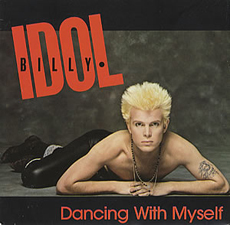 There was always something about the slick, dense production of Idol’s post-Generation X work that ran counter to his badass persona; it’s tough to suss out just how much of a rocker he is under all those layers of studio frippery. His best tracks, like “White Wedding” and “Eyes Without a Face,” have an edge that overcome this; “Dancing With Myself” doesn’t quite. There’s a bit of neither-fish-nor-fowl at work here for me that keeps me from getting entirely pulled in. Does sound pretty damn good over the car radio though.
There was always something about the slick, dense production of Idol’s post-Generation X work that ran counter to his badass persona; it’s tough to suss out just how much of a rocker he is under all those layers of studio frippery. His best tracks, like “White Wedding” and “Eyes Without a Face,” have an edge that overcome this; “Dancing With Myself” doesn’t quite. There’s a bit of neither-fish-nor-fowl at work here for me that keeps me from getting entirely pulled in. Does sound pretty damn good over the car radio though.
Dave Steed — I always liked Billy Idol but just like Dan said, the guy made some wimpy music for having such a badass persona. He’s had cheesier over the years but “Dancing with Myself” fits in that wimpy category for sure.
David Lifton — This is one of the few songs that I pretended to like at temple youth group dances so that my peers would think I was cool. It didn’t work. Apparently holding up a fist and sneering didn’t mesh with incredible nearsightedness.
Jack Feerick — I don’t know what the hell you guys are talking about, because this still sounds pretty massive to me. There’s just this relentless quality to it. The jacked-up drumbeat, that guitar line nagging like a migraine headache, bassline chunking away at the lowest note on the instrument, the whiplash slap echo on the vocal even as it dissolves into shrieking babble — just unstoppable, and still a floor-filler.
The video — directed by horror-film legend Tobe Hooper, guys! — is still probably my second-favorite zombie apocalypse movie. But what’s with that fleeting shot of the Sibyl Fawlty look-alike at her knitting, while her hubby jauntily prepares to dispatch her with a sledgehammer? That shit is dark.
David Medsker — I gotta say, I’m surprised by the overall vitriol the group is exuding this week, especially with this song. All right, so there were people who could out-punk Billy Idol at the time — who cares? Watered-down or not, Idol served a purpose in that he made people aware of a world of music outside of MTV and Top 40 radio. You can wag your finger at him all you want about how non-punk this is, but at that point in time, this is exactly what a lot of people needed to hear in order to understand what they were missing. I’m sure I will use this phrase several times in this piece, but Billy Idol was a gateway drug to better things.
Dunphy — At least as far as the Idol song goes, the negativity for me isn’t about how punk or not punk he’s being here. It’s more that he has so much better stuff to offer as examples – “White Wedding” is the big one, but I’d go so far to say “Eyes Without A Face” is also more compelling that “Dancing With Myself.”
Java Joel Murphy — First time I heard Billy Idol was in the late summer of ’82 when my local top 40 station (the awfully named “Pac-93”) played “Hot In The City.” I pictured him as a large black man. MTV never played the video to this song. Eventually saw him on Solid Gold.
Isn’t this song about playing with yourself? Has Popdose ever done an article about “songs about playing with yourself”? We should.
Feerick — Article? It’s a whole series, and it’s called ”Like, Omigod!” You should totally check it out.
#2 Loverboy, ”Working for the Weekend” (1982)
#29 Pop, #2 Mainstream Rock.
Dunphy — The soundtrack for decades of pickup truck commercials, ’80s “Rock Blocks” on your local radio station, the get-psyched anthem down at the crappy bar in town that stirs the stretchmark fashionistas (male and female) to action… by action I mean order another drink and keep ordering until the past two decades melt away like polar icecaps. This song will make a mullet grow on a bald man. It’s also a much better song than “Lovin’ Every Minute Of It,” which doesn’t say much for “Lovin’ Every Minute Of It.” I wonder if Loverboy will be headlining any rock cruises anytime soon.
Murphy — For an over-the-top, arena rock 80’s song, this song has an incredibly pretty melody. Especially the verses. Seriously. Try whistling it. Haunting, I tell ya. Wistful, even.
Wiencek — The advent of beer-commercial rock. I want to cut these guys some slack, as they’re little more than a punchline at this point, but there’s really not much to like about this.
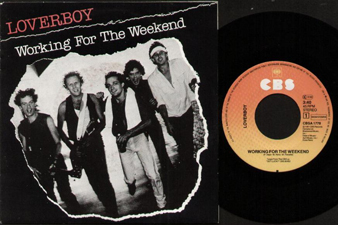 Boone — The smartest thing you can ever do as a songwriter is to write a song that gets perpetual airplay — a Christmas song, for instance, or better yet, one that gets played every Friday until the end of time on every godawful “listen while you work” lite FM radio station in America. And, well, Canada, too, in this case. Kudos to you, Headband Charlie.
Boone — The smartest thing you can ever do as a songwriter is to write a song that gets perpetual airplay — a Christmas song, for instance, or better yet, one that gets played every Friday until the end of time on every godawful “listen while you work” lite FM radio station in America. And, well, Canada, too, in this case. Kudos to you, Headband Charlie.
Chris Holmes — In that spirit I’m booking some studio time for my solo debut, “Ain’t No Party (Like an Arbor Day Party).” I’m gonna be rich, I tell you, RICH!
Wiencek — I myself am working on my breakout, covering-all-bases single, “I Like Things (That Are Fun).”
Medsker — Didn’t Fake Tony Bennett (Alec Baldwin on SNL) already write that?
Boone — Such is the enduring popularity of “Teddy Bears’ Picnic.”
Steed — This is still the anthem for hating your job. All I have to do is see the title to get me thinking about leaving work on a Friday afternoon.
Feerick — Mm. I heard this recently on satellite radio — man, what kind of godless sadist plays ”Working for the Weekend” at 11:00 AM on a Tuesday?
Anyway: far be it from me criticize anyone on the basis of looks, but even skinny Mike Reno looks fat. Like pre-fat. It’s the chipmunk cheeks, I think. Well, that and the skintight pants, and the big brightly-colored overshirt. They do exactly the opposite of what they’re presumably meant to do, and draw attention to Mike’s gut. You would think a band as big as Loverboy could afford a stylist, who could point out how tragically unflattering Reno’s look really was.
The song itself? Two-thirds okay. The chorus is undeniably a monster, the turnaround and the gddy-up guitar hook that follows are stone killers, even with the emblematic (read: dated) synth tone on the former. The verses, though, are kind of a drag, and fail to live up to even the lyrical standards of ”You want a piece of my heart / You better start from the start,” which is, frankly, not a particularly high bar to hurdle.
”Everyone’s looking to see if it was you” sounds like the lament of a dude who’s cut a fart at the office and is hoping no one will notice. Not the thing to make me think of weekend good times.
Lifton — I’ve said it before and I’ll say it again: Fuck you, Matt Wardlaw.
Matt Wardlaw — Dave, you always say the sweetest things. But why do you have to make Mike Reno cry like that?
Lifton — Because he sucks. Duh.
Medsker — This is an easy song to make fun of, but I must confess that I loved, loved, loved this song as a misfit junior high schooler. I chalk it up to two things: the guitar riff after the chorus, and the editing of the video, where they made that drummer look like one of the best drummers on the planet.
#3 Rick Springfield, ”Jessie’s Girl” (1981)
#1 US, #1 Australia
Medsker — Or, as it was known in my house when my daughter would put spaghetti in her hair, “Messy Girl.” I think this song holds up remarkably well. That’s all I got.
Matthew Bolin — Can we embed an extra media file of Jason’s friend Kathleen screaming her head off? (Any Acoustic 80s fans out there know exactly what I’m talking about.)
Annie Zaleski — I can’t wait to tell the story about Matt and Rick Springfield at our wedding!
Feerick — Okay, spill.
Boone — Springfield has claimed in multiple interviews that he doesn’t remember the friend whose girlfriend inspired the song, thus he doesn’t really remember who the real “Jessie’s Girl” is. Bullshit. You remember the things that made you a millionaire. He definitely still creeps on Jessie, and Jessie’s girl on Facebook.
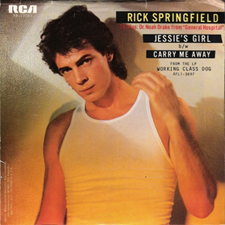 Wiencek — I’m sure there were rock songs before “Jessie’s Girl” about the perils of falling in love with your best friend’s girl, but nothing seemed to quite catch that feeling the way this song does. Poor Rick always seemed to want to be taken more seriously as a rocker than he was — I saw a clip of him trying to destroy a Stratocaster on stage that’s one of the most pathetic sights I’ve ever seen — and it made him seem that much more of a joke once his popularity waned.
Wiencek — I’m sure there were rock songs before “Jessie’s Girl” about the perils of falling in love with your best friend’s girl, but nothing seemed to quite catch that feeling the way this song does. Poor Rick always seemed to want to be taken more seriously as a rocker than he was — I saw a clip of him trying to destroy a Stratocaster on stage that’s one of the most pathetic sights I’ve ever seen — and it made him seem that much more of a joke once his popularity waned.
But this song is no joke; it taps into a universal situation in an instantly identifiable way. In retrospect, it seems surprising that it took so long for someone to write this. And it rocks pretty well for a Top 40 number of the time; it’s really the synth blasts in the bridge that date it the most. If this has turned out to be the primary song for which Rick is remembered, that’s not such a bad thing.
Dunphy — Three things about this song:
- I like it more than I thought I would. It sounds dated as all get out, but it’s still a fun song.
- You’d have to be a total dullard to not know what the title of this song was by how many times Springfield sings “Jessie’s Girl,”
- When I was young I had a friend named Jessie. She didn’t find this amusing at all.
Feerick — Hey, it’s an artist on the comp who is actually called out in another song on the comp! Albeit indirectly: ”General Hospi-Tale“ has the throwaway line, ”Paging Dr. Noah Drake to ICU to treat a case of heartbreak,” which references the character Springfield played on General Hospital.
Springfield is an interesting case, as hyphenates go, in that he was a musician before turning to acting — a failed one, to be slightly uncharitable — who was able to successfully use his acting exposure to jumpstart his music career. Usually it work the other way around — musicians who turn to acting are cast to capitalize on their pre-existing celebrity. And their music careers languish as the Hollywood money becomes steady and they age out of pop stardom — e.g., Ice-T, Justin Timberlake, or Queen Latifah, to name a few recent cases.
Larger implications aside, this is a very solid piece of work. Classic tension-and-release setup, expertly executed. That guitar riff at the breakdown isn’t quite as beefy as it thinks it is — in fact, the whole record could use a little more bottom end — but it’s entirely serviceable.
Lifton — I know a lot of my power pop-loving friends swear by his earlier, lesser-known material. I’ve tried, but never found those records to be anything more than passable. But this is as good as it gets. Like “My Sharona,” it’s one of those songs where nostalgia overshadows how perfect it is.
Dunphy — Agreed. I gave Springfield’s latest at try last year. Songs For The End Of The World, it was called. Springfield looked on the cover, to me, like a slightly less-tattooed, less-hepatitis’ed Tommy Lee. The actual music left me cold as a British romance. Taken in that context, Springfield certainly did hit upon something that clicked during the Working Class Dog era.
Steed — I saw Rick Springfield live in December and he was still rockin’ in his early ’60s. The ladies behind me kept telling me that I was doing a good job acting excited to be there with my wife. Hell, she was there with me! I didn’t need to see him without his shirt on during the encore but I’m okay being one of the few men to actually ask for tickets to see him. And “Jessie’s Girl” was probably the least exciting song of the night simply because I’ve heard it 1,000 times.
Murphy — If you don’t like this song, you don’t like pop music. Stop pretending.
#4 Tom Tom Club, ”Genius Of Love” (1981)
Reached #31 in the Hot 100, and #1 for Hot Dance Club Play.
Steed — I’m really not a huge fan of “Genius of Love,” but it’s going to get sampled until the end of time, and I’m okay with that.
Dunphy — I sure hope Frantz and Weymouth made some good money from Mariah’s usage! I’m calling this the song of the week, but not by leaps and bounds.
Wiencek — I didn’t hear this song until well after the fact, and in truth, my young self probably wouldn’t have got into it. Though a catchy piece, it’s dance music for the ironic age; if some part of you thought disco might eventually come back, this song should have put those hopes (or fears) to rest.
Lifton — Dan, you can pretty much say Talking Heads in general was dance for the ironic age, except they weren’t ironic about their love of it. I like the hook and the overall sound of it, but I prefer what they were doing in their day job at the time.
Murphy — 1982 was was a great year for white folk on “black” radio (that’s what they called it back then). Hall & Oates, the J. Geils Band’s “Flamethrower”, “I Keep Forgettin”. This one went all the way to #2 on the R&B chart. I remember seeing that trippy-ass video on HBO’s Video Jukebox. And the track has dated really well, actually. Incredibly funky.
Medsker — I’m actually amazed that this went Top 40. It seems too forward-thinking to dent the charts. Of the five songs we’re covering this week, this is the one I like the most today. I’d probably change the station if any of the other four came on, but if this one came on, I’d reach for the volume knob. James Browwwwwwwn, James Browwwwwwwn…
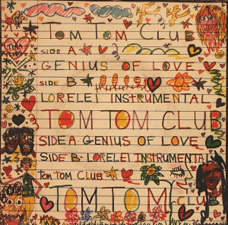 Feerick — Another one that calls out another artist with a song on the same comp! (Kurtis Blow, of course, who put in an appearance back in Week Two.)
Feerick — Another one that calls out another artist with a song on the same comp! (Kurtis Blow, of course, who put in an appearance back in Week Two.)
I much prefer the full album version of this — it has a little room to breathe as it slowly morphs along. It’s two chords in an unending groove, moving from warped girl-group harmonies to abstract dubby keyboard noise to chants, cartoon voices, and half-assed rapping, in a constant stream of pop-culture references. But even in its edited form, ”Genius of Love” has that weird disconnected dreaminess of young erotic besottedness.
The effect is doubled by the lyrics, which sit awkwardly in the meter, often with the ac-CENT falling on the wrong syl-LAB-le — like poetry written in the margins of the notebook in study hall, and mashed into a karaoke track. It’s wonderful stuff, and the clear winner of the week for me, just edging out Billy Idol.
And it’s the song that inspired me to check out Bohannon (Bohannon, Bohannon, Bohannon), for which I will be forever grateful.
Boone — Careful, you guys. If Mariah Carey reads this, she’ll get the idea to sample this song for the 11th time.
Mike Heyliger — Strangely, as much as folks in this thread are mentioning “Genius of Love” being sampled into oblivion, the only song I remember ever hearing a sample of it on is Mariah Carey’s “Fantasy.” Am I having an old-man blonde moment?
Dan Walsh — Here’s one that I thought of: X-Ecutioners with Biz Markie.
Holmes — There’s a bunch listed here.
Feerick — Wikipedia knows all.
#5 The J. Geils Band, ”Centerfold” (1981)
#1 US and Canada, #3 UK
Boone — The original humblebrag / First World Problems.
Wiencek — The first record I fell head-over-heels for was Freeze Frame. I didn’t know at the time that the band once known as America’s Rolling Stones had transformed itself into a faux-New Wave act to make it big. Wouldn’t have cared if I did. This was pretty much the song in our second-grade class, even if none of us really quite got what the whole “centerfold” thing was about, or why it upset the guy in the song so much.
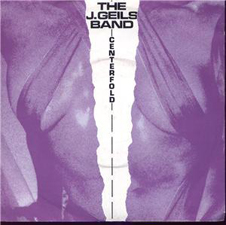 There are so many great hooks: that opening riff which I can’t even tell what it is, keys and saxes and harp mashed together or something; the refrain, which bursts open with that phrase “My blood runs cold!”; and of course the best na-na chorus since “Hey Jude.”
There are so many great hooks: that opening riff which I can’t even tell what it is, keys and saxes and harp mashed together or something; the refrain, which bursts open with that phrase “My blood runs cold!”; and of course the best na-na chorus since “Hey Jude.”
Medsker — The consensus #1 song and #1 video of my entire eighth grade class. None of us gave a damn about what J Geils Band used to be; yes, we knew “Musta Got Lost” and “Love Stinks,” but nothing we had heard on the radio from J Geils exploded from the speakers like this song did. Insanely catchy keyboard riff, punctuated by hand claps = radio catnip. And the shot in the video of the drummer hitting the snare drum full of milk still looks great today.
Murphy — This song was an absolute phenomenon. Right up there with “Physical,” and “Bette Davis Eyes” and the like. I remember one of the topics of conversation at my second grade lunch table was how much the “whistle part” at the end resembled the theme to The Smurfs — which was the hot new thing on Saturday morning TV around that time.
Feerick — OH MY GOD YOU’RE RIGHT:
[youtube id=”YtrEkjpumjs” width=”600″ height=”350″]Steed — Eh. Another one of these songs that I can do without at this point. I’ll take “Freeze Frame” over this one — until I hear that too much as well.
Feerick — Local heroes again — but unlike with Billy Squier, I was always well aware of how big a deal they were on the national scene. And why not? These guys were hitting it on all cylinders here.
What really makes it work, I think, is the way the combination of influences come together. The Geils Band was nominally a white-boy soul outfit, but Stephen Jo Bladd is a heavy, straight-ahead rock drummer, while bassist Danny Klein leans towards the funk, and Seth Justman’s keyboards hearken back to 60s garage rock.
Jerome Geils himself was a lot less visible, and his role less obvious, despite being the name above the title. But listening today, I’m struck by how versatile he was, moving from crushing power chords to scritchy-scratchy funk to spaghetti-western twang and finally that low, Link Wray-style snarl on the coda. Not flashy, maybe not a lot of chops on display per se, but a lot of thought and a lot of taste.
My mind is still blown by the Smurfs thing, though.
Lifton — I’ve talked about this before, but I can’t even think of “Centerfold” without recalling it, so here it goes again: Because my parents didn’t like rock music, we rarely listened to it in the car. Pretty much the only time was Sunday mornings, when we were allowed to put on American Top 40 on the way to Hebrew school. I have a distinct memory of this being played as we were pulling into the synagogue parking lot. It had been out for a while, so of course I knew it, but they were hearing it for the first time, and they were not amused that their not-yet-teenage son was hearing songs about porno mags.
Dunphy — This doesn’t hold a candle to their white-boy soul-rock songs from the ’70s, it’s not even their best of this era, it is juvenile in the quaintness of hyperventilating over sexy pictures in a magazine (I wonder if Billy Idol looks at this when he’s dancing with himself), but the track as it stands is a pleasant pop curio. It also drifts into the realm of novelty song, but at least you can whistle along.





Comments